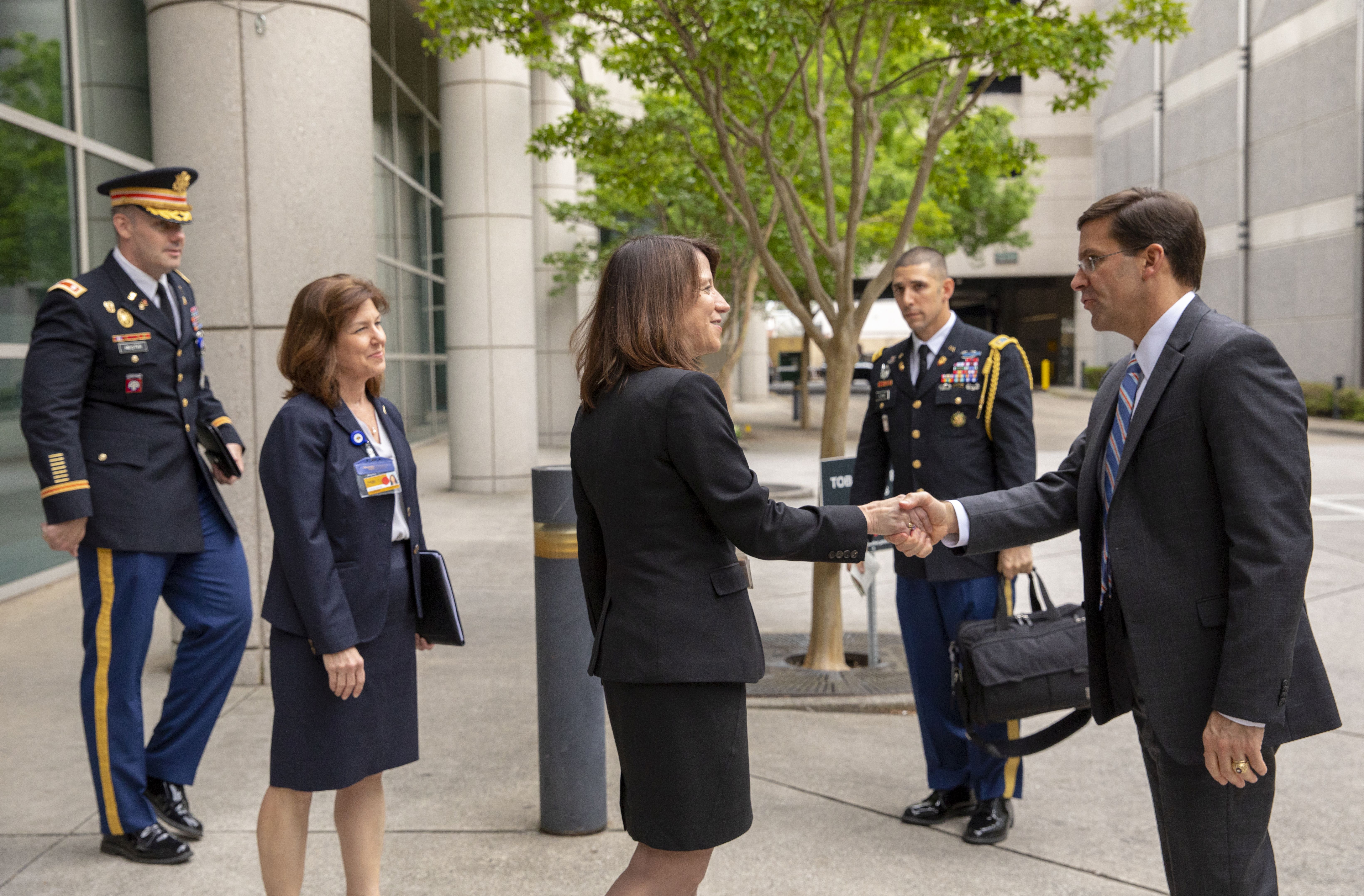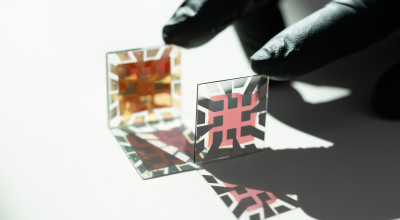
On April 25, 2019, the Georgia Tech Research Institute (GTRI) hosted the Honorable Mark Esper, the Secretary of the Army, at its headquarters to present GTRI’s distinct portfolio of advanced technologies and demonstration capabilities. As the Army’s largest University Affiliated Research Center (UARC), GTRI holds a critical role in developing innovations for the Army, and Dr. Esper was truly impressed with the breadth and depth of GTRI’s capabilities. In his April 26 tweet, Dr. Esper shared, “Great visit to GTRI to see and discuss ongoing U.S. Army projects for Army Futures and the U.S. Army CCDC (Combat Capabilities Development Command). It is exciting to have the U.S. Army partner with such a renowned research center.”
The visit was hosted by Georgia Tech’s interim senior vice president and director of GTRI, Dr. Lora Weiss, and Georgia Tech’s associate vice president and chief of staff, Ms. Lynn Durham. The portfolio of demonstrations that were presented to Dr. Esper included
- Analysis of alternatives for force level integration, where the goal is to apply set-based design to drive the Department of Defense toward a data-driven portfolio analysis that quantifies the trade between present-day readiness, warfighting capability and capacity, and future readiness burden
- Swarming unmanned and autonomous systems, where GTRI is developing unmanned and autonomous systems that have advanced autonomy for complex swarming mission execution and equipped with robust, long-range radio communications
- Next generation infrared imaging technologies, which enable both passive and active sensing using one multi-band infrared image sensor with a single optical aperture, to provide significantly improved situational awareness to the warfighter while minimizing the size, weight, and power burden of the sensor
- Army reprogramming analyses, where GTRI has a team that has been developing technical capabilities and mission solutions to enhance the Army’s ability to be nimble in rapidly changing environments
- Ground electronic warfare technologies and testbed, where GTRI has been developing advanced capabilities and deploying prototype systems in support of test events and large-force exercises
Following his visit to GTRI, the Secretary of the Army, Dr. Mark Esper, met with the Georgia Tech Army Reserve Officer Training Command (ROTC) Detachment commanded by Lieutenant Colonel John Meister. Secretary Esper met with the ROTC Cadre and staff to discuss Army recruiting at Georgia Tech, in Georgia, and at the national level. Secretary Esper reinforced his commitment to this successful ROTC program and enjoyed reminiscing about his time in the 101st Airborne Division with the Cadre and Staff on hand.
As an Army UARC, GTRI has a five-year contract with the Army, with a renewal option for an additional five years. The contract has a total ceiling of $2.35 billion over the ten-year period. This broad-based contract will continue the already established long-term partnership between GTRI and the Army. It is another important instrument that enables the Army and academia to collaborate and solve the Army’s most challenging priorities, including readiness and modernization. In the past year, GTRI has received more than 38 task orders on the contract with sponsors from not only the Army, but also the Air Force, DARPA, and the Office of the Secretary of Defense. A hallmark of GTRI being an Army UARC is that GTRI offers the Army unique competencies that support maintaining and advancing these capabilities on behalf of national defense needs. This enables GTRI to support the mission of the Army Futures Command by providing with a relationship that provides rapid, innovative solutions
Dr. Weiss and Dr. Chaouki Abdallah, Georgia Tech executive vice president for research, recently joined Dr. Esper at the Army’s activation of the Army Futures Command Artificial Intelligence (AI) Task Force, which was held at Carnegie Mellon University. GTRI has a broad portfolio of application areas where it is applying artificial intelligence, including predicative maintenance for Army helicopters as part of the Army’s AI Hub.
GTRI is an active participant in the Army AI Hub based out of the National Robotics and Engineering Center at Carnegie Mellon. The goal of the AI Hub is to quickly link AI experts from premier universities and government science and technology organizations to rapidly solve pressing needs for the Army. As part of the team, GTRI is participating in a series of cross functional team meetings covering various topics. On April 24-25, GTRI representatives were on hand to discuss problem needs in the area of Future Vertical Lift. As a rotorcraft center of excellence with a rich research portfolio on unmanned autonomous vehicles as well as condition-based maintenance, Georgia Tech was able to align many existing efforts to the specific needs of the Future Vertical Lift. On hand at the conference were the leads of the AI Task Force, including Army Brigadier General Easley and Army Colonel Matty, who are eager to encourage cross-university collaboration and research teams.
Another area that GTRI is exploring with the Army is using Artificial Intelligence for warfighter health, which would support garrison health care personnel, warfighters, and families. The technical goals are to create a shared understanding of significant military health challenges, including factors in operational challenges and data availability, and then identify applicable AI capabilities. On April 26, a team from GTRI was invited to a meeting to support advancing this critical area.
These Army AI Task Force activities are coordinated with the recently established DoD Joint Artificial Intelligence Center (JAIC). The JAIC is seeking cross-service problems that could benefit from AI research, consolidation of data, and collaborative teams. The JAIC works closely with the AI task forces with each of the services, including the Army AI Hub. The JAIC is organizing these large AI problems under National Mission Initiatives, three of which are underway: Predictive Maintenance, Humanitarian Assistance/Disaster Relief, and Cyber Sensemaking. Looking forward, these initiatives will continue to expand to new key mission areas, and GTRI is well-positioned to provide input to those potential areas.



